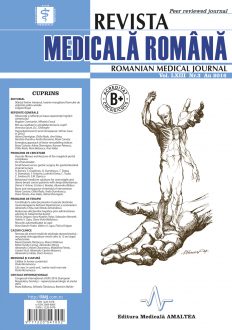SELECT ISSUE

Indexed

| |

|
|
|
| |
|
|
|

|
|
|
|
|
|
|
HIGHLIGHTS
National Awards “Science and Research”
NEW! RMJ has announced the annually National Award for "Science and Research" for the best scientific articles published throughout the year in the official journal.
Read the Recommendations for the Conduct, Reporting, Editing, and Publication of Scholarly work in Medical Journals.
The published medical research literature is a global public good. Medical journal editors have a social responsibility to promote global health by publishing, whenever possible, research that furthers health worldwide.
Small bowel versus gastric surgery for gastrointestinal stromal tumors
A. Stamatoiu, C. ŞAVLOVSCHI, C. Tudor, D. DUMITRESCU, F. Fotache, Ludmila Florea, R. BORCAN, S. Gradinaru, S.M. Oprescu and T. TROTEA
ABSTRACT
Objectives. The aim of the study was to compare the postoperative and oncologic outcomes of small bowel versus gastric surgery for gastrointestinal stromal tumors (GISTs).
Background. The feasibility of the small bowel resection for GIST has been demonstrated; however, its impact on outcomes, particularly its oncologic safety for tumors greater than 5 cm, remains unknown.
Methods. Among 93 patients treated for a stromal tumor in SUUB between 2001 and 2015, patients who underwent primary resection for a gGIST smaller than 20 cm (N = 66), by either small bowel (group S, n = 28) or gastric surgery (group G, n = 38), were compared. Multivariable analyses and propensity score matching were used to compensate for differences in baseline characteristics.
Results. In hospital mortality and morbidity rates in groups S and G were 0.0% versus 2.6% (P = 0.086) and 10.7% vs 18.4% (P = 0.004), respectively. Small bowel resection was independently protective against inhospital morbidity (odds ratio 0.54, P = 0.014). The rate of R0 resection was 96.4% in group S and 92.1% in group G (P = 0.103). After 1:1 propensity score matching (n= 22), the groups were comparable according to age, sex, tumor location and size, mitotic index, American Society of Anaesthesiology score, and the extent of surgical resection. After adjustment for BMI, overall morbidity (9.1% vs 19.6%; P = 0.005), surgical morbidity (4.5% vs 9.1%; P = 0.048), and medical morbidity (4.5% vs 13.6%; P = 0.01) were significantly lower in group S. Five year recurrence- free survival was significantly better in group S (89.3% vs 82.6%; P = 0.011). In tumors greater than 5 cm, in hospital morbidity and 5 year recurrence- free survival were similar between the groups (P = 0.255 and P = 0.423, respectively).
Conclusions. Small bowel resection for GISTs is associated with favourable short term outcomes without compromising oncologic results.
Keywords: GIST, small bowel resection, gastric surgery, morbidity, mortality, mitotic index, 5-year recurrence, 5-year recurrence-free survival, oncological outcomes
Full text | PDF
